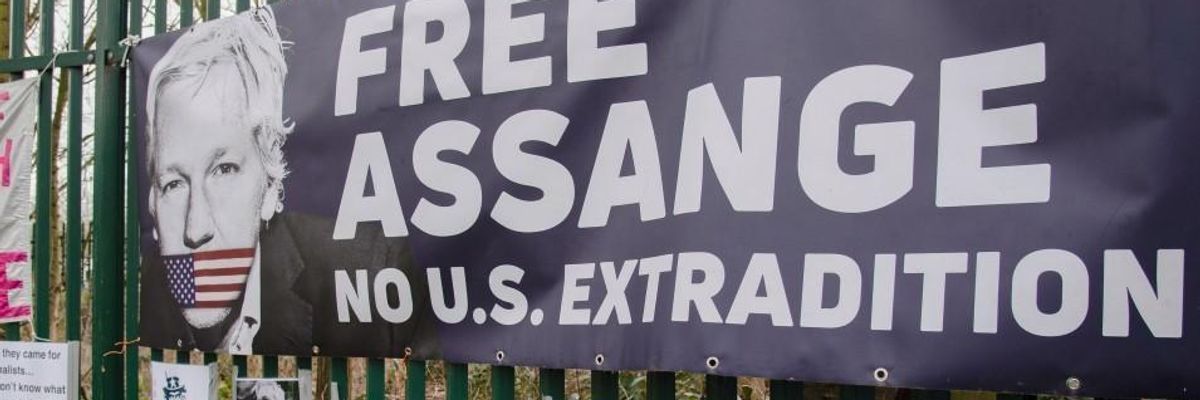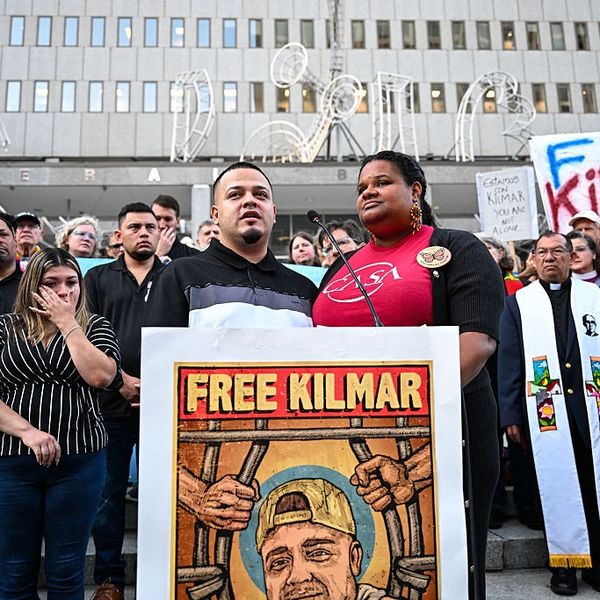
"The decision was based on the U.S. prison system being so awful and repressive that Assange would be at significant suicide risk," noted Trevor Timm, executive director of the Freedom of the Press Foundation. (Photo: Claire Doherty/Getty Images)
'A Huge Relief': British Judge Rejects Trump Administration Attempt to Extradite Julian Assange
"Let this be the end of it," said whistleblower Edward Snowden.
This is a breaking news story... Check back for updates...
A British judge early Monday rejected the Trump administration's attempt to extradite Julian Assange to the United States, citing the risk such a move would pose to the WikiLeaks founder and publisher's life.
Judge Vanessa Baraitser of the Westminster Magistrates' Court warned that extradition "would be oppressive by reason of Assange's mental health" and said the risk of the publisher committing suicide in a U.S. prison would be "substantial."
"Wow. The decision was based on the U.S. prison system being so awful and repressive that Assange would be at significant suicide risk," tweeted Trevor Timm, executive director of the Freedom of the Press Foundation (FPF).
\u201cThis is one thing Americans should really reflect on. The British are as authoritarian as it gets in W. Europe, deeply subservient to the US. Yet this is the third time they're refused to extradite on the grounds that the US prison system is barbaric:\n\nhttps://t.co/ZDqLT2McB7\u201d— Glenn Greenwald (@Glenn Greenwald) 1609759667
The U.S. is expected to appeal the ruling (pdf). Pending U.S. appeal, Assange's lawyers are asking that he be released on bail from London's notorious Belmarsh prison, where the WikiLeaks founder has been detained since 2019.
While the judge did not reject the U.S. request due to the threat extradition would pose to press freedoms, advocates nevertheless celebrated the judge's decision as "a huge relief to anyone who cares about the rights of journalists."
If extradited to the U.S., Assange would face a sentence of up to 175 years in prison for publishing classified documents--something journalists do all the time.
"The case against Julian Assange is the most dangerous threat to U.S. press freedom in decades," noted FPF. "The extradition request was not decided on press freedom grounds; rather, the judge essentially ruled the U.S. prison system was too repressive to extradite. However, the result will protect journalists everywhere."
In response to Baraitser's decision, NSA whistleblower Edward Snowden tweeted simply, "Let this be the end of it."
An Urgent Message From Our Co-Founder
Dear Common Dreams reader, The U.S. is on a fast track to authoritarianism like nothing I've ever seen. Meanwhile, corporate news outlets are utterly capitulating to Trump, twisting their coverage to avoid drawing his ire while lining up to stuff cash in his pockets. That's why I believe that Common Dreams is doing the best and most consequential reporting that we've ever done. Our small but mighty team is a progressive reporting powerhouse, covering the news every day that the corporate media never will. Our mission has always been simple: To inform. To inspire. And to ignite change for the common good. Now here's the key piece that I want all our readers to understand: None of this would be possible without your financial support. That's not just some fundraising cliche. It's the absolute and literal truth. We don't accept corporate advertising and never will. We don't have a paywall because we don't think people should be blocked from critical news based on their ability to pay. Everything we do is funded by the donations of readers like you. Will you donate now to help power the nonprofit, independent reporting of Common Dreams? Thank you for being a vital member of our community. Together, we can keep independent journalism alive when it’s needed most. - Craig Brown, Co-founder |
This is a breaking news story... Check back for updates...
A British judge early Monday rejected the Trump administration's attempt to extradite Julian Assange to the United States, citing the risk such a move would pose to the WikiLeaks founder and publisher's life.
Judge Vanessa Baraitser of the Westminster Magistrates' Court warned that extradition "would be oppressive by reason of Assange's mental health" and said the risk of the publisher committing suicide in a U.S. prison would be "substantial."
"Wow. The decision was based on the U.S. prison system being so awful and repressive that Assange would be at significant suicide risk," tweeted Trevor Timm, executive director of the Freedom of the Press Foundation (FPF).
\u201cThis is one thing Americans should really reflect on. The British are as authoritarian as it gets in W. Europe, deeply subservient to the US. Yet this is the third time they're refused to extradite on the grounds that the US prison system is barbaric:\n\nhttps://t.co/ZDqLT2McB7\u201d— Glenn Greenwald (@Glenn Greenwald) 1609759667
The U.S. is expected to appeal the ruling (pdf). Pending U.S. appeal, Assange's lawyers are asking that he be released on bail from London's notorious Belmarsh prison, where the WikiLeaks founder has been detained since 2019.
While the judge did not reject the U.S. request due to the threat extradition would pose to press freedoms, advocates nevertheless celebrated the judge's decision as "a huge relief to anyone who cares about the rights of journalists."
If extradited to the U.S., Assange would face a sentence of up to 175 years in prison for publishing classified documents--something journalists do all the time.
"The case against Julian Assange is the most dangerous threat to U.S. press freedom in decades," noted FPF. "The extradition request was not decided on press freedom grounds; rather, the judge essentially ruled the U.S. prison system was too repressive to extradite. However, the result will protect journalists everywhere."
In response to Baraitser's decision, NSA whistleblower Edward Snowden tweeted simply, "Let this be the end of it."
This is a breaking news story... Check back for updates...
A British judge early Monday rejected the Trump administration's attempt to extradite Julian Assange to the United States, citing the risk such a move would pose to the WikiLeaks founder and publisher's life.
Judge Vanessa Baraitser of the Westminster Magistrates' Court warned that extradition "would be oppressive by reason of Assange's mental health" and said the risk of the publisher committing suicide in a U.S. prison would be "substantial."
"Wow. The decision was based on the U.S. prison system being so awful and repressive that Assange would be at significant suicide risk," tweeted Trevor Timm, executive director of the Freedom of the Press Foundation (FPF).
\u201cThis is one thing Americans should really reflect on. The British are as authoritarian as it gets in W. Europe, deeply subservient to the US. Yet this is the third time they're refused to extradite on the grounds that the US prison system is barbaric:\n\nhttps://t.co/ZDqLT2McB7\u201d— Glenn Greenwald (@Glenn Greenwald) 1609759667
The U.S. is expected to appeal the ruling (pdf). Pending U.S. appeal, Assange's lawyers are asking that he be released on bail from London's notorious Belmarsh prison, where the WikiLeaks founder has been detained since 2019.
While the judge did not reject the U.S. request due to the threat extradition would pose to press freedoms, advocates nevertheless celebrated the judge's decision as "a huge relief to anyone who cares about the rights of journalists."
If extradited to the U.S., Assange would face a sentence of up to 175 years in prison for publishing classified documents--something journalists do all the time.
"The case against Julian Assange is the most dangerous threat to U.S. press freedom in decades," noted FPF. "The extradition request was not decided on press freedom grounds; rather, the judge essentially ruled the U.S. prison system was too repressive to extradite. However, the result will protect journalists everywhere."
In response to Baraitser's decision, NSA whistleblower Edward Snowden tweeted simply, "Let this be the end of it."

